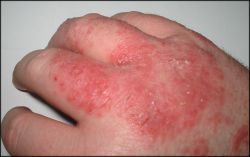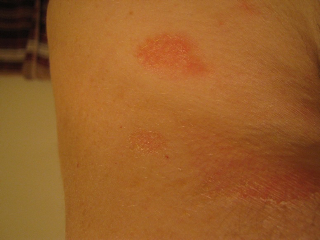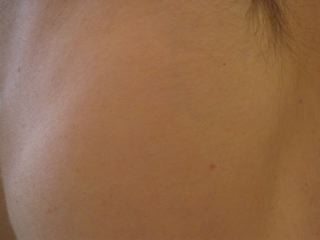Eczema
We use the term eczema to refer to a range of persistent skin conditions, including dryness and especially recurring skin rashes that have one or more of these features: redness, skin edema (swelling), itching and dryness, crusting, flaking, blistering, cracking, oozing, or bleeding.
The rash can occur anywhere on the skin, but compared to psoriasis, it more often occurs on the softer, inner, flexor surfaces of the skin. Unlike psoriasis, it does not have the build up of scaley plaque.

Image source:
Wikipedia
Chinese Medical Diagnosis
We make a Chinese diagnosis of skin rashes based on the characteristics of the lesions.
If the skin feels dry, this means the condition involves blood deficiency.
If it looks red, this means the patient has heat (inflammation) in the blood. The redder the skin, the more heat in the blood. This will get worse in hot weather. Almost all cases of eczema involve heat (inflammation) in the blood.
If the lesions have any purple color present, this means the condition involves blood stagnation.
Itching also indicates heat, and the more intense the itching, the more heat present.
If the skin blisters or oozes, this means that the patient has a condition we call "dampness" in Chinese medicine.
Acupuncture
Research indicates that acupuncture can help to relieve the itch of eczema, and I have had good results in my practice.
For example, Pfab et al tested the Influence of acupuncture on type I hypersensitivity itch and the wheal and flare response in adults with atopic eczema in a blinded, randomized, placebo-controlled, crossover trial. They compared true acupuncture (at traditional acupoints) with placebo acupuncture and no acupuncture. They found that:
"Acupuncture at the correct points showed a significant reduction in type I hypersensitivity itch in patients with atopic eczema. With time the preventive point-specific effect diminished with regard to subjective itch sensation, whereas it increased in suppressing skin-prick reactions."
Herbal Medicine
I consider herbal medicine the main treatment modality for eczema. I design the formula specifically for the individual in question, because no two cases have exactly the same combination of heat, dampness, blood deficiency, or blood stagnation. A formula will contain a mix of herbs that differs depending on the degree of heat, etc. apparent in the condition.
Researchers have also tested the effectiveness of Chinese herbal medicine in treating eczema. The Cochrane Database Reviews published a review of trials using Chinese herbal medicine for this disorder, but they found only four good quality trials, and three looked only at a "stock" prepared formula called Zemaphyte, not a customized blend such as I would make. Nevertheless, they reported:
"Three trials were randomised placebo controlled, two-phase cross-over designs assessing the same Chinese herbal mixture, Zemaphyte.
In two of these three trials the reduction in erythema and surface damage was greater on Zemaphyte than on placebo, and participants slept better and expressed a preference for Zemaphyte.
One trial also reported that participants itched less.
The fourth trial was an open-label design comparing Zemaphyte in herbal form with Zemaphyte as a freeze dried preparation. There was a reduction in erythema and surface damage with both formulations, but no comparison between the two formulations was reported.
Some adverse effects were reported in all four trials, but none were regarded as serious.
AUTHORS' CONCLUSIONS: Chinese herbal mixtures may be effective in the treatment of atopic eczema."
You can read the abstract
here.
Diet
According to both traditional Chinese medicine and modern research, animal flesh, eggs, fats, and dairy products all promote eczema. The fats in these foods promote inflammation, and also reduce microcirculation to the skin.
Since food allergies can cause atopic skin disorders, I recommend getting a food allergy test.
Gluten found in wheat, rye, barley, spelt, kamut, and related grains may cause skin rashes in some people. However, animal products are the more common triggers.
I recommend a low allergen diet composed primarily of whole grains, vegetables, fruits, legumes, and moderate amounts of seed and nuts. It is best to avoid all animal products, particularly those high in fats, but at the very least restrict them to small portions (~2 ounces) of light seafood only a couple of times a week. Such a way of eating has anti-inflammatory and skin-healing nutrients like vitamin A, zinc, and quality fats.
Eczema Treatment Example
I treated this patient with herbal medicine. Before treatment the skin under the arm looked like this:

After two months of internal herbal medicine treatment, it looked like this:

